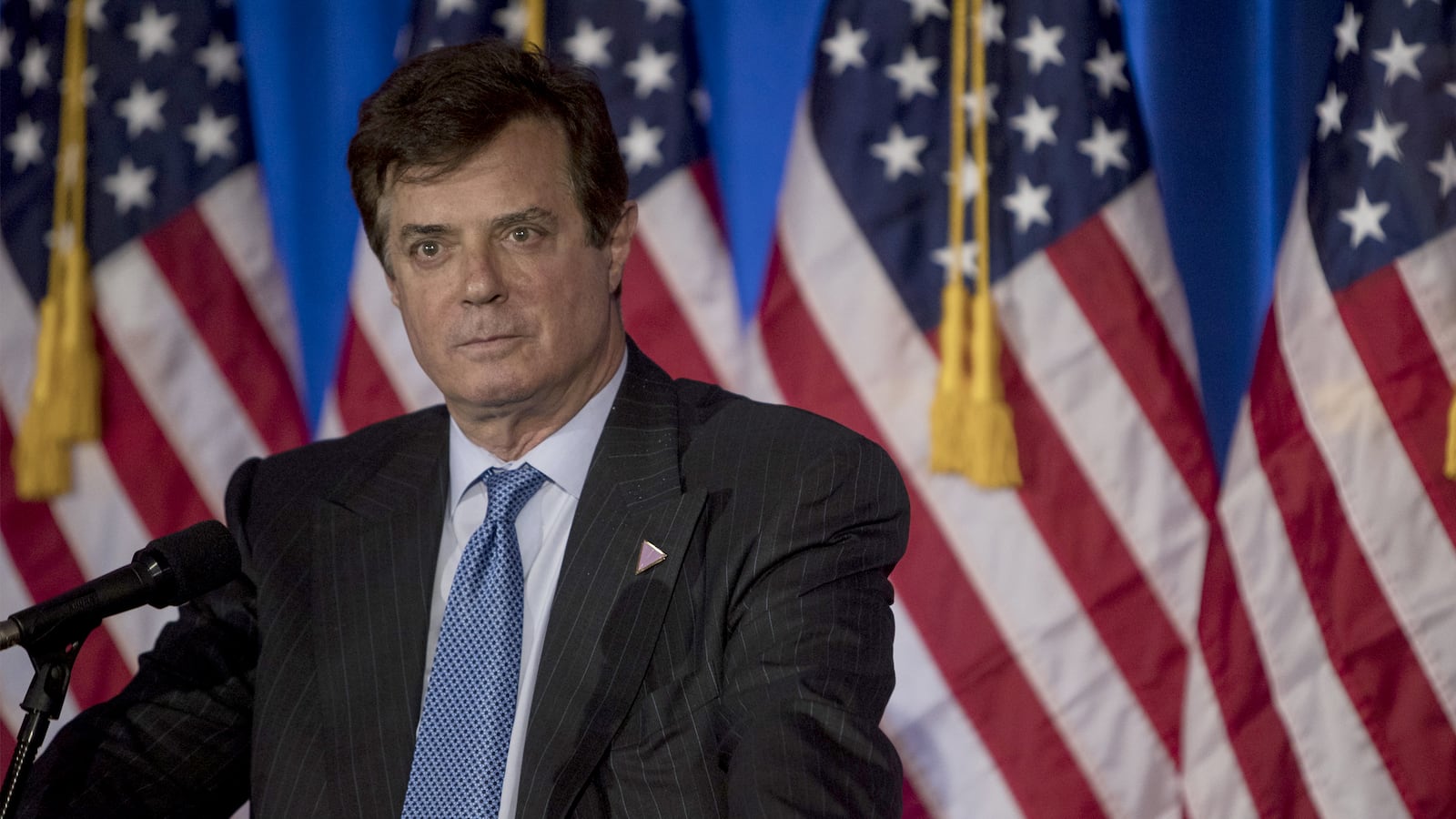Paul Manafort, the former chairman of Donald Trump’s presidential campaign, his longtime protégé Rick Gates, and a foreign policy advisor, became the first three Trump associates charged as a result of special prosecutor Robert Mueller’s probe into Russian interference in the 2016 presidential election.
The charges come just five months after Mueller opened his wide-ranging investigation into Russian meddling in the 2016 election.
Trump and his team have long tried to disassociate themselves from Manafort, whose ties with Russian and Ukrainian businessmen have come under greater scrutiny since he helped Trump secure the Republican nomination. But he was one of the most senior figures in the campaign and helped organize the GOP convention over the summer.
Manafort agreed to surrender himself to authorities at the FBI office in Washington, D.C., arriving soon after 8 a.m. this morning.
The charges, which include “conspiracy against the United States,” “conspiracy to launder money,” and “false and misleading statements,” among others, were unsealed on Monday morning.
George Papadopoulos, a foreign policy advisor, to the Trump campaign has also been charged, and pleaded guilty. Mueller says he lied about his relationship with figures in Russia while working for Trump. The indictment, which was unsealed on Monday, claims that he had regular contact with Russians who had high-level access in Moscow.
During an interview with the FBI, Papadopoulos attempted to downplay these links, which included a message that Putin wanted to meet Trump and suggestions that the Russians could help with "dirt" on Hillary Clinton in teh form of thousands of emails.
The indictment said he claimed his only contacts with a “Female Russian National” came before he joined the Trump campaign, but that was not true.
The first charges come barely five months after Deputy Attorney General Rod Rosenstein appointed Mueller as special prosecutor. And they’re not expected to be the last. In addition to Manafort, Gates and Papadopoulos, Mueller’s team is also believed to have sufficient information to indict Mike Flynn, Trump’s first national security adviser.
“There are two people I think just from press reporting that it is likely to be, either Mike Flynn or Paul Manafort,” Rep. Adam Schiff (D-CA), the senior Democrat on the House intelligence committee, told ABC News on Sunday, ahead of any indictment.
The impending prosecution creates substantial pressure on both Manafort and Gates to trade testimony or other cooperation against other Trump associates, or Trump himself, in exchange for leniency.
The indictments also have political salience. Trump and the Republican Party are now guaranteed to enter next year’s midterm elections with at least two prosecutions of senior Trump associates hanging overhead. Yet few congressional Republicans have shown an appetite to break with Trump beyond interpersonal blowups. The louder Trump critics on the right, like Arizona Senator Jeff Flake and Tennessee Senator Bob Corker, have chosen retirement instead of a bruising internecine fight.
Trump’s administration and congressional allies have engaged in a furious effort over the past week to change the subject to alleged Democratic misdeeds.
Sarah Huckabee Sanders, the White House press secretary, has accused Hillary Clinton’s campaign of “colluding” with Russia on the basis that a Clinton campaign attorney partially financed the firm Fusion GPS’s opposition-research project that led to an anti-Trump dossier. Trump ally Rep. Devin Nunes (R-CA), the chairman of the House intelligence committee, announced Tuesday an investigation into an Obama-era uranium deal with Russia that other Trump allies have portrayed as a conspiracy to enrich the Clinton Foundation. Some Republicans, including New Jersey Gov. Chris Christie and pro-Trump publications, have called for Mueller’s resignation.
Other Republicans, however, have stressed that they would not tolerate Mueller’s firing or any large-scale interference with his investigation.
Monday’s indictments are likely to further strain relations between Trump and his attorney general, Jeff Sessions. Sessions was the first GOP senator to full-throatedly embrace Trump, whose anti-immigrant agenda he had long espoused. But the relationship soured after Trump criticized Sessions for recusing himself from the Russia probe, which resulted in the appointment of a special counsel. Trump even attacked Sessions publicly as “very weak” and mused that Sessions ought to resign for “disloyalty.”
Yet it was Trump’s drastic firing of FBI Director James Comey on May 9 that guaranteed Sessions and Rosenstein would appoint an independent prosecutor. Trump initially misrepresented his rationale for firing the FBI Director, stressing that it had stemmed from Comey’s pre-election actions in handling the investigation into Clinton's use of private email. Later, Trump told NBC’s Lester Holt that he let Comey go because of the Russia investigation.
“And in fact when I decided to just do it, I said to myself, I said ‘You know, this Russia thing with Trump and Russia is a made-up story, it’s an excuse by the Democrats for having lost an election that they should have won,’” Trump said May 11.
By that point, Sessions had already recused himself from the Russia probe, owing to his meeting with Russian Ambassador Sergey Kislyak during the campaign. The Comey firing and Trump’s stated rationale prompted alarm that the president was obstructing justice and Rosenstein, who was heading the investigation, responded by appointing Mueller.
How Trump reacts to Monday's indictments is unclear though, potentially, hugely consequential. Trump has in the past flirted with firing Mueller and his team has attempted to discredit Mueller’s inquiry as ridden with conflicts of interest. Yet Trump attorney Ty Cobb has reportedly warned the president against escalating any opposition to Mueller.
Nico Hines contributed to this report.





